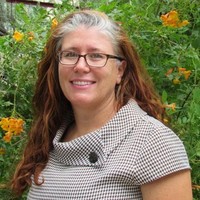Hi, I’m Cyn di Tuell, the Arizona and New Mexico Director for Western Watersheds Project. With 17 years of experience as an attorney and conservation advocate, I’m passionate about safeguarding our natural habitats. I currently serve as the Chair of the Sierra Club’s Grand Canyon Chapter Executive Committee and the Conservation Chair of the Sierra Club Nopales Group in Southern Arizona. My journey in conservation began in 2007, focusing on federal public lands management in New Mexico and Arizona. Over the years, I’ve collaborated with national and local conservation partners to protect native species’ habitats and promote sustainable land management.
di Tuell, the Arizona and New Mexico Director for Western Watersheds Project. With 17 years of experience as an attorney and conservation advocate, I’m passionate about safeguarding our natural habitats. I currently serve as the Chair of the Sierra Club’s Grand Canyon Chapter Executive Committee and the Conservation Chair of the Sierra Club Nopales Group in Southern Arizona. My journey in conservation began in 2007, focusing on federal public lands management in New Mexico and Arizona. Over the years, I’ve collaborated with national and local conservation partners to protect native species’ habitats and promote sustainable land management.
As a second-generation Tucsonan, I hold a law degree and a Bachelor’s in Ecology and Evolutionary Biology from the University of Arizona. My undergraduate studies focused on the impacts of livestock grazing on arid ecosystems. During law school, I worked with the Sonoran Institute on State Trust Lands issues and co-authored a publication with the Lincoln Institute of Land Policy. I also researched water infrastructure and agricultural water demands with law professor Robert Glennon. My dedication to conservation has been recognized with several awards, including the Nancy Zierenberg Sky Island Advocate Award in 2013, the Sierra Club’s Conservationist of the Year Award in 2015, and the James A. St. Amant Special Award in 2021 for my work protecting the Sonoran desert tortoise.
What Inspired Me to Join Western Watersheds Project?
I was drawn to Western Watersheds Project because of their commitment to protecting wildlife and wild places from the damaging effects of livestock grazing. With my background in science and law, I knew I could contribute significantly to preserving the natural beauty of Arizona and New Mexico.
My Role at Western Watersheds Project
As the Arizona and New Mexico Director, no two days are the same. Some days, I’m out in the field, gathering data on the impact of livestock grazing on Arizona’s wild places. This involves reading maps, hiking, taking photos, collecting data, and enjoying the outdoors. Other days, I’m at my desk, writing letters to land managers, urging them to better protect the wildlife I care deeply about. A typical desk day includes reading and sending emails, filing Freedom of Information Act requests, researching the latest science on grazing impacts to wolves or fish, talking to reporters about areas that need protection, and collaborating with colleagues from other organizations. Occasionally, I even get to help file a lawsuit.
Projects I’m Passionate About
One of the projects I’m most proud of is being part of the legal team that stopped livestock grazing authorizations in the Sonoran Desert National Monument. I also helped organize a union at Western Watersheds Project, which was a significant achievement.
My Favorite Place in the American West
Anywhere there are wolves. Hearing them howl in the wild for the first time is an experience I’ll never forget.
Staying Motivated
Having a supportive work culture helps me stay motivated and positive. I feel empowered to follow my instincts, the law, and the science, which makes me an effective advocate for the wild. Spending time in the places I’m working to protect also keeps me going. There’s nothing better than watching the sunset and the moon rise in a remote campsite after a day of doing what I love.
What I Enjoy in My Free Time
What’s “free time”? Just kidding! I love spending time outside with my family, especially my kids. Camping and hiking are my favorite activities.
Cyndi Tuell’s work is a testament to her passion for conservation and her commitment to protecting the wild places of Arizona and New Mexico. Her diverse experiences and dedication make her a powerful advocate for the environment. Get in touch! cyndi@westernwatersheds.org






